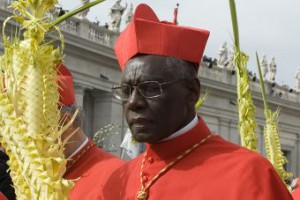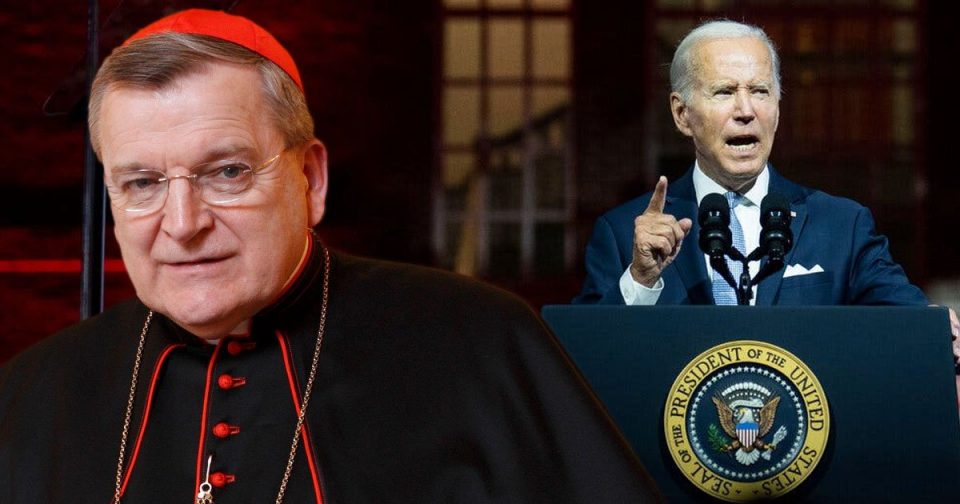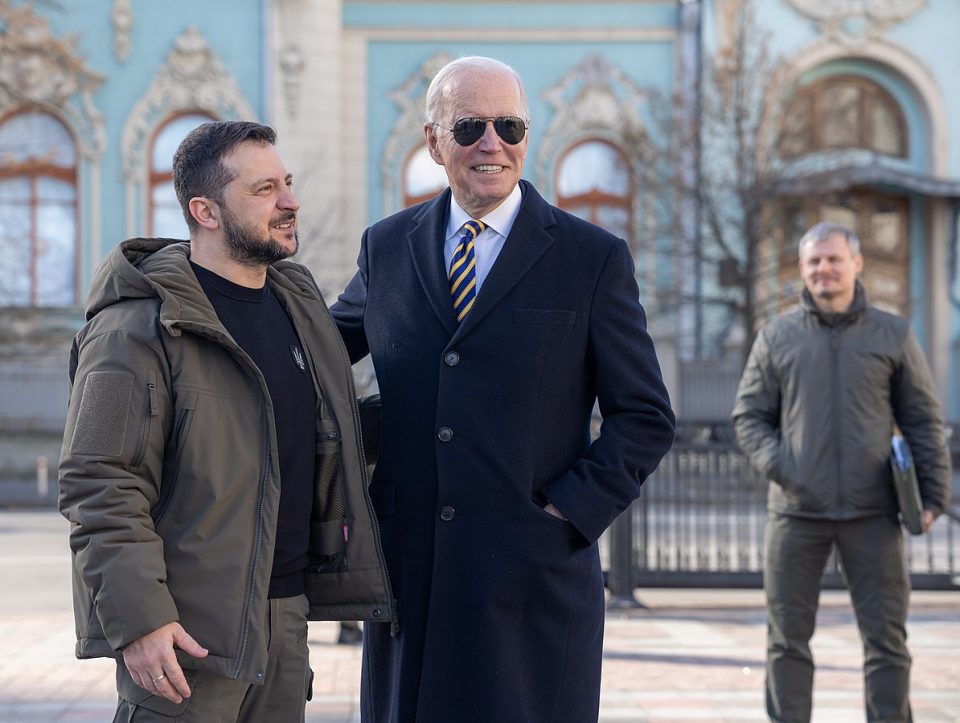 Robert Card. Sarah has corrected homosexualist activist Jesuit James Martin, SJ., in the pages of the Wall Street Journal.
Robert Card. Sarah has corrected homosexualist activist Jesuit James Martin, SJ., in the pages of the Wall Street Journal.
How Catholics Can Welcome LGBT Believers
It’s possible to stay faithful to the church’s teachings without turning away millions.
By Cardinal Robert SarahThe Catholic Church has been criticized by many, including some of its own followers, [including Jesuit James Martin, SJ] for its pastoral response to the LGBT community. This criticism deserves a reply—not to defend the Church’s practices reflexively, but to determine whether we, as the Lord’s disciples, are reaching out effectively to a group in need. Christians must always strive to follow the new commandment Jesus gave at the Last Supper: “Love one another, even as I have loved you.”
To love someone as Christ loves us means to love that person in the truth. “For this I was born,” Jesus told Pontius Pilate, “to bear witness to the truth.” The Catechism of the Catholic Church reflects this insistence on honesty, stating that the church’s message to the world must “reveal in all clarity the joy and demands of the way of Christ.”
Those who speak on behalf of the church must be faithful to the unchanging teachings of Christ, because only through living in harmony with God’s creative design do people find deep and lasting fulfillment. Jesus described his own message in these terms, saying in the Gospel of John: “These things I have spoken to you, that my joy may be in you, and that your joy may be full.” Catholics believe that, with the guidance of the Holy Spirit, the church draws its teachings upon the truths of Christ’s message.
Among Catholic priests, one of the most outspoken critics of the church’s message with regard to sexuality is Father James Martin, an American Jesuit. In his book “Building a Bridge,” published earlier this year, he repeats the common criticism that Catholics have been harshly critical of homosexuality while neglecting the importance of sexual integrity among all of its followers.
Father Martin is correct to argue that there should not be any double standard with regard to the virtue of chastity, which, challenging as it may be, is part of the good news of Jesus Christ for all Christians. For the unmarried—no matter their attractions—faithful chastity requires abstention from sex.
This might seem a high standard, especially today. Yet it would be contrary to the wisdom and goodness of Christ to require something that cannot be achieved. Jesus calls us to this virtue because he has made our hearts for purity, just as he has made our minds for truth. With God’s grace and our perseverance, chastity is not only possible, but it will also become the source for true freedom.
We do not need to look far to see the sad consequences of the rejection of God’s plan for human intimacy and love. The sexual liberation the world promotes does not deliver its promise. Rather, promiscuity is the cause of so much needless suffering, of broken hearts, of loneliness, and of treatment of others as means for sexual gratification. As a mother, the church seeks to protect her children from the harm of sin, as an expression of her pastoral charity.
In her teaching about homosexuality, the church guides her followers by distinguishing their identities from their attractions and actions. First there are the people themselves, who are always good because they are children of God. Then there are same-sex attractions, which are not sinful if not willed or acted upon but are nevertheless at odds with human nature. And finally there are same-sex relations, which are gravely sinful and harmful to the well-being of those who partake in them. People who identify as members of the LGBT community are owed this truth in charity, especially from clergy who speak on behalf of the church about this complex and difficult topic. [Do I hear an “Amen!”?]
It is my prayer that the world will finally heed the voices of Christians who experience same-sex attractions and who have discovered peace and joy by living the truth of the Gospel. I have been blessed by my encounters with them, and their witness moves me deeply. I wrote the foreword to one such testimony, Daniel Mattson’s book, “Why I Don’t Call Myself Gay: How I Reclaimed My Sexual Reality and Found Peace,” [US HERE – UK HERE] with the hope of making his and similar voices better heard.
These men and women testify to the power of grace, the nobility and resilience of the human heart, and the truth of the church’s teaching on homosexuality. In many cases, they have lived apart from the Gospel for a period but have been reconciled to Christ and his church. Their lives are not easy or without sacrifice. Their same-sex inclinations have not been vanquished. But they have discovered the beauty of chastity and of chaste friendships. Their example deserves respect and attention, because they have much to teach all of us about how to better welcome and accompany our brothers and sisters in authentic pastoral charity.
Cardinal Sarah is prefect of the Congregation for Divine Worship and the Discipline of the Sacraments.
Appeared in the September 1, 2017, print edition.
As a counterpoint, Jesuit-run organ of Jesuitical apologetics, Amerika Magazine, has Fr James Martin’s response to Card. Sarah’s WSJ piece. Here is some.
First, Martin declared victory because someone listened to him. Well, whoopdeedo.
Then…
“Cardinal Sarah’s op-ed inaccurately states that my book is critical of church teaching, which it is not. Nor am I,” Father Martin said.
Is that so?
Martin thinks that the language of the Catechism of the Catholic Church ought to be changed, that’s all. Of course, change the language, and you change the meaning of the paragraph.
What Martin proposes is that the Church stop calling homosexual acts disordered and rather call them “different”. The are “differently ordered”.
UPDATE:
At Catholic World Report an Evangelical writer responded to Martin in regard to the “Nashville Statement”.
[…]
Martin’s tweets confirm the by-now widely held perception, reinforced repeatedly by Martin himself, that his raison d’etre involves undermining the Catholic Church’s upholding of Jesus’ teaching on a male-female foundation for sexual ethics, upon which Jesus’ teaching about the binary character of marriage (twoness) is based.
A consideration of Martin’s “seven ways” of responding to the Nashville Statement (an evangelical declaration that affirms “that it is sinful to approve of homosexual immorality or transgenderism and that such approval constitutes an essential departure from Christian faithfulness” (Article 10)) underscore the truncated gospel (or even anti-gospel) with which Martin operates.
[…]
The bottom line is this: Fr. Martin is using—or even abusing—his office to undermine what for Jesus was a foundational standard for sexual ethics.
_________________







